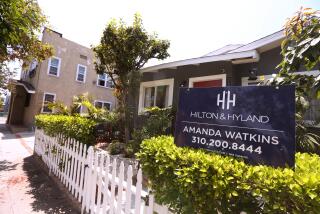These Trying Times : Job Security Evaporates as Economic Ripple Effect Hits Home : Until the turnaround comes, however, the South Bay will continue to feel the recession in several areas: Cities
- Share via
With laid-off residents paying less sales tax and the flagging real estate market holding down property tax income, South Bay city officials are glumly trying to craft balanced budgets with less money.
Like private sector companies, area cities have instituted hiring freezes, laid off workers and searched for new sources of money, including increasing fees for everything from business licenses to flag football games.
Despite such measures, most South Bay cities expect to fall short this year.
Carson, which depends heavily on sales tax revenue, expects to fall $1.4 million short when the fiscal year ends June 30. The city most likely will have to dip into its reserve fund to balance its $29.6-million budget. Next year, officials are projecting a $3-million deficit if spending is not cut.
Manhattan Beach also will be tapping its reserves for $1.5 million to offset flat sales and bed tax income, as well as a substantial dip in building permit fees. The fees, which totaled $1.1 million in 1989-90, are expected to reach only $587,600 for 1990-91.
In Redondo Beach, where the municipal budget flourished in the 1980s along with the city’s booming economy, officials are projecting an annual $2-million deficit in future years unless the city tightens spending.
“If we were in the private sector, that would be known as being on the brink of bankruptcy,” City Manager William Kirchhoff told the City Council recently. “The (financial) indicators are all moving the wrong way.”
Hawthorne, also heavily reliant on sales taxes, is buying fewer cars, installing fewer water mains and instituting a hiring freeze.
Even those cities that do not lean so heavily on sales taxes are feeling the recession’s impact. In Rancho Palos Verdes, property transfer tax income has fallen dramatically, an indicator that home sales are down. In 1988-89, the city collected about $300,000 in property transfer taxes; this year, the city expects to receive $153,000.
Torrance, meanwhile, expects the real estate slowdown to translate into an $850,000 drop-off in property tax revenue for the 1991-92 fiscal year.
“I’m saying it’s going to affect us dramatically,” said Ben Murdoch, city revenue administrator. Torrance officials originally projected they would collect $101.6 million in revenues next year. They now have cut that forecast to $99.38 million.
In Rolling Hills Estates, city coffers are expected to feel the closure of a Buffums department store in the Peninsula Center. The store accounted for 4% of the city’s total sales tax revenue, or about $62,000.
Palos Verdes Estates City Manager James Hendrickson said his city is trying to make ends meet by shaving costs of what he called “big ticket items.” During the past two years, for example, the city has trimmed $550,000 from the city attorney’s budget.
Other cities, such as Inglewood, have decided to become more aggressive about collecting taxes due them. Inglewood officials have been pressing owners of the city’s 45 hotels and motels to either prove they do not do more business than they claim or face back payments on the city’s 10% hotel/motel bed tax.
Despite their current hardships, however, many city officials believe the worst is over.
Hawthorne City Manager James H. Mitsch said recent interest rate declines and the decision to keep open the Los Angeles Air Force Base in El Segundo make him optimistic about the South Bay’s future.
“I think the people in the South Bay and Hawthorne have a renewed confidence in the system and people are now going to be more willing to invest,” Mitsch said. “More businesses will open up, and I see a general feeling that the economy is turning around.”
Times staff writers Gerald Faris, Shawn Hubler, Deborah Schoch and Tim Waters contributed to this story.
More to Read
Inside the business of entertainment
The Wide Shot brings you news, analysis and insights on everything from streaming wars to production — and what it all means for the future.
You may occasionally receive promotional content from the Los Angeles Times.










